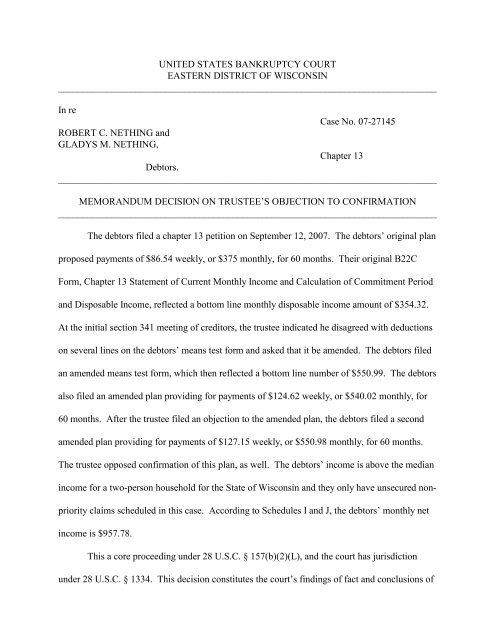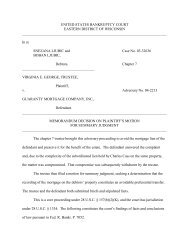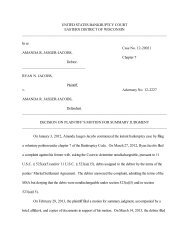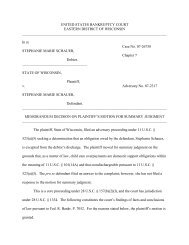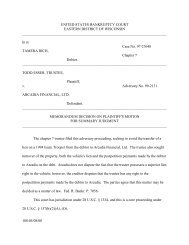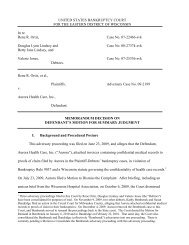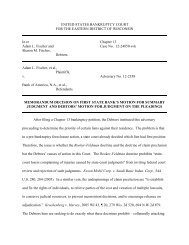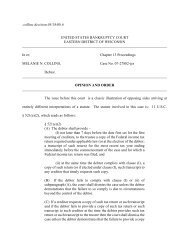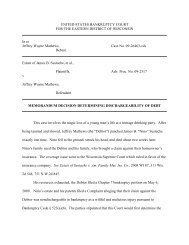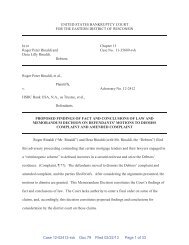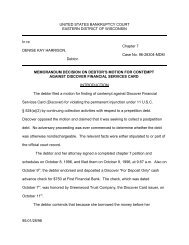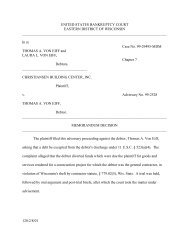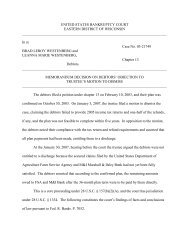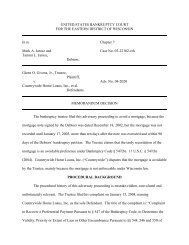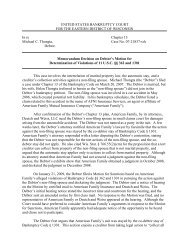In re Robert & Gladys Nething, Case No. 07-27145 - Eastern District ...
In re Robert & Gladys Nething, Case No. 07-27145 - Eastern District ...
In re Robert & Gladys Nething, Case No. 07-27145 - Eastern District ...
Create successful ePaper yourself
Turn your PDF publications into a flip-book with our unique Google optimized e-Paper software.
UNITED STATES BANKRUPTCY COURT<br />
EASTERN DISTRICT OF WISCONSIN<br />
______________________________________________________________________________<br />
<strong>In</strong> <strong>re</strong><br />
<strong>Case</strong> <strong>No</strong>. <strong>07</strong>-<strong>27145</strong><br />
ROBERT C. NETHING and<br />
GLADYS M. NETHING,<br />
Chapter 13<br />
Debtors.<br />
______________________________________________________________________________<br />
MEMORANDUM DECISION ON TRUSTEE’S OBJECTION TO CONFIRMATION<br />
______________________________________________________________________________<br />
The debtors filed a chapter 13 petition on September 12, 20<strong>07</strong>. The debtors’ original plan<br />
proposed payments of $86.54 weekly, or $375 monthly, for 60 months. Their original B22C<br />
Form, Chapter 13 Statement of Cur<strong>re</strong>nt Monthly <strong>In</strong>come and Calculation of Commitment Period<br />
and Disposable <strong>In</strong>come, <strong>re</strong>flected a bottom line monthly disposable income amount of $354.32.<br />
At the initial section 341 meeting of c<strong>re</strong>ditors, the trustee indicated he disag<strong>re</strong>ed with deductions<br />
on several lines on the debtors’ means test form and asked that it be amended. The debtors filed<br />
an amended means test form, which then <strong>re</strong>flected a bottom line number of $550.99. The debtors<br />
also filed an amended plan providing for payments of $124.62 weekly, or $540.02 monthly, for<br />
60 months. After the trustee filed an objection to the amended plan, the debtors filed a second<br />
amended plan providing for payments of $127.15 weekly, or $550.98 monthly, for 60 months.<br />
The trustee opposed confirmation of this plan, as well. The debtors’ income is above the median<br />
income for a two-person household for the State of Wisconsin and they only have unsecu<strong>re</strong>d nonpriority<br />
claims scheduled in this case. According to Schedules I and J, the debtors’ monthly net<br />
income is $957.78.<br />
This a co<strong>re</strong> proceeding under 28 U.S.C. § 157(b)(2)(L), and the court has jurisdiction<br />
under 28 U.S.C. § 1334. This decision constitutes the court’s findings of fact and conclusions of
law pursuant to Fed. R. Bankr. P. 7052.<br />
follows:<br />
ISSUE<br />
The court minutes from the January 29, 2008, p<strong>re</strong>liminary hearing state the issue as<br />
The<strong>re</strong> is a deduction on line 50 for chapter 13 administrative expenses of the trustee, but<br />
the debtors’ attorney’s fees a<strong>re</strong> not provided for in the form. The debtor’s position is that<br />
the attorney is also an unsecu<strong>re</strong>d c<strong>re</strong>ditor, and the fee should be part of the total needed to<br />
be paid. The trustee counts only other unsecu<strong>re</strong>d c<strong>re</strong>ditors.<br />
Stated another way, must a chapter 13 plan provide payments sufficient to pay unsecu<strong>re</strong>d<br />
c<strong>re</strong>ditors at least as much as is shown on the bottom line of the means test form, times 60, or<br />
must the plan provide for this amount, plus the claim for attorney’s fees?<br />
ARGUMENTS<br />
The trustee objected to confirmation of the debtors’ plan because the means test indicates<br />
mo<strong>re</strong> projected disposable income is <strong>re</strong>qui<strong>re</strong>d than what is being dedicated to the plan. <strong>In</strong> the<br />
trustee’s brief – which was filed befo<strong>re</strong> the second amended plan and subsequent objection – he<br />
argued “according to the means test, the debtor [sic] should be paying $550.99 monthly toward<br />
the unsecu<strong>re</strong>d claims. The plan calls for payment of $540 monthly, which is not sufficient to<br />
provide all projected disposable income under the bankruptcy code.” After that brief was filed,<br />
the debtors filed their second amended plan, which provided for payments of $127.15 weekly, or<br />
$550.98 monthly, for 60 months. The trustee objected to that plan, arguing it “provides for<br />
c<strong>re</strong>ditors with unsecu<strong>re</strong>d claims to <strong>re</strong>ceive $29,535.40 while the means test <strong>re</strong>qui<strong>re</strong>s $33,059.40.”<br />
The debtors argue the bottom line of the means test was not intended as an interim<br />
calculation to which other fees we<strong>re</strong> supposed to be added. If Cong<strong>re</strong>ss had intended all<br />
disposable income to be paid only on nonpriority unsecu<strong>re</strong>d debts, it could have done so. Section<br />
2
1325(b)(1)(B) of the Bankruptcy Code <strong>re</strong>qui<strong>re</strong>s the plan provide all of the debtors’ projected<br />
disposable income <strong>re</strong>ceived during the applicable commitment period be applied to make<br />
payments to unsecu<strong>re</strong>d c<strong>re</strong>ditors. The operative word in section 1325(b)(1)(B) is “applied,” and<br />
payments to unsecu<strong>re</strong>d c<strong>re</strong>ditors have always included the trustee fee as well as a claim for the<br />
debtors’ unpaid attorney’s fees and other administrative fees.<br />
DISCUSSION<br />
Confirmation of a chapter 13 plan is governed by 11 U.S.C. § 1325. Under that section,<br />
the court cannot confirm a chapter 13 plan, over an objection by the trustee or the holder of an<br />
allowed unsecu<strong>re</strong>d claim, unless (1) the plan proposes to pay the unsecu<strong>re</strong>d claims in full, or (2)<br />
“the plan provides that all of the debtor’s projected disposable income to be <strong>re</strong>ceived in the<br />
applicable commitment period beginning on the date that the first payment is due under the plan<br />
will be applied to make payments to unsecu<strong>re</strong>d c<strong>re</strong>ditors under the plan.” 11 U.S.C. §<br />
1325(b)(1)(B). At issue in this case is whether the debtors have complied with the <strong>re</strong>qui<strong>re</strong>ments<br />
of section 1325(b)(1)(B).<br />
The term “disposable monthly income” means a debtor’s cur<strong>re</strong>nt monthly income, as<br />
defined by section 101(10A), less amounts <strong>re</strong>asonable necessary to be expended “for the<br />
maintenance or support of the debtor or a dependent of the debtor, or for a domestic support<br />
obligation, that first becomes payable after the date the petition is filed,” for charitable<br />
contributions in an amount not to exceed 15 percent of a debtor’s gross income, and, if the debtor<br />
is engaged in business, for the payment of costs necessary for the continuation, p<strong>re</strong>servation, and<br />
operation of that business. 11 U.S.C § 1325(b)(2). If a debtor’s cur<strong>re</strong>ntly monthly income, when<br />
multiplied by 12, is g<strong>re</strong>ater than the median family income for a household of the same size, and<br />
3
in the same state whe<strong>re</strong> the debtor <strong>re</strong>sides, then the “[a]mounts <strong>re</strong>asonably necessary to be<br />
expended under [§ 1325(b)(2)], shall be determined in accordance with subparagraphs (A) and<br />
(B) of section 7<strong>07</strong>(b)(2).” 11 U.S.C. § 1325(b)(3). Schedules I and J no longer determine plan<br />
payments for above-median income debtors.<br />
It is undisputed that the debtors’ “cur<strong>re</strong>nt monthly income” is g<strong>re</strong>ater than the median<br />
income for a two-person family in Wisconsin. The question of which c<strong>re</strong>ditors should sha<strong>re</strong> in<br />
the payment to unsecu<strong>re</strong>d c<strong>re</strong>ditors made by above-median income debtors has been conside<strong>re</strong>d<br />
by a number of courts. As was raised he<strong>re</strong>, the discussion generally involves the distinction<br />
between priority and nonpriority c<strong>re</strong>ditors. See generally <strong>In</strong> <strong>re</strong> Wilbur, 344 B.R. 650 (Bankr. D.<br />
Utah 2006) (above-median debtors must pay disposable income exclusively to non-priority<br />
unsecu<strong>re</strong>d c<strong>re</strong>ditors). He<strong>re</strong>, the court has to consider specifically whether the term “unsecu<strong>re</strong>d<br />
c<strong>re</strong>ditors” includes a specific priority administrative expense claimant, i.e., the debtors’ attorney.<br />
<strong>In</strong> an article discussing the means test, Judge Wedoff fo<strong>re</strong>saw this issue while analyzing<br />
the deduction for priority debt set forth in section 7<strong>07</strong>(b)(2)(A)(iv):<br />
Though straightforward, this provision appears to raise at least two questions: First a<br />
debtor might seek to deduct not only priority claims that a<strong>re</strong> actually outstanding at the<br />
time of the bankruptcy filing, but also hypothetical priority claims that might be<br />
anticipated over the five year period measu<strong>re</strong>d by the means test. For example, a Chapter<br />
13 debtor’s attorney’s fees a<strong>re</strong> a priority administrative expense under §§ 330(a)(4)(B),<br />
502(b)(2), and 5<strong>07</strong>(a)(2), and it might be argued that a debtor would <strong>re</strong>asonably incur<br />
such a priority claim in pursuing the five-year Chapter 13 plan hypothesized by the means<br />
test. This argument, however, is unlikely to be persuasive. ... [T]he means test<br />
specifically provides for one type of potential administrative expense in connection with a<br />
hypothetical Chapter 13 case – the fees assessed by the standing Chapter 13 trustee. <strong>No</strong><br />
similar deduction is specified for debtor’s attorney’s fees, and so it is likely that a<br />
deduction for such fees – or any other hypothetical priority claims – would be denied<br />
under the maxim exp<strong>re</strong>ssio unius est exclusio alterius.<br />
Eugene R. Wedoff, Means Testing in the New § 7<strong>07</strong>(b), 79 AM. BANKR. L.J. 231, 273 (2005).<br />
4
The matter was also discussed in Collier on Bankruptcy, albeit from a diffe<strong>re</strong>nt angle:<br />
[C]ourts will hopefully <strong>re</strong>cognize that an administrative expense is an unsecu<strong>re</strong>d claim<br />
and that section 1325(b) <strong>re</strong>qui<strong>re</strong>s funds <strong>re</strong>maining after the means test deductions to be<br />
paid to “unsecu<strong>re</strong>d c<strong>re</strong>ditors” generally, not just nonpriority c<strong>re</strong>ditors. “C<strong>re</strong>ditor” is<br />
defined as an entity holding a p<strong>re</strong>petition claim. <strong>No</strong>rmally, the debtor’s attorney seeking<br />
payment of fees is seeking payment primarily of p<strong>re</strong>petition fees. Mo<strong>re</strong>over, the<br />
provision me<strong>re</strong>ly states that unsecu<strong>re</strong>d c<strong>re</strong>ditors a<strong>re</strong> the entities to be paid from disposable<br />
income. It does not limit the payments to payments on p<strong>re</strong>petition claims. <strong>In</strong> addition,<br />
interp<strong>re</strong>ting section 1325(b) to p<strong>re</strong>clude payment of administrative expenses would place<br />
it in di<strong>re</strong>ct conflict with section 1326(b), which <strong>re</strong>qui<strong>re</strong>s payment of “any unpaid claim”<br />
under section 5<strong>07</strong>(a)(2), which provides for administrative claim priority. <strong>In</strong> light of all<br />
these factors, it seems very unlikely courts will adopt a <strong>re</strong>ading of the statute that<br />
p<strong>re</strong>cludes payment of the expenses necessary to administer the case.<br />
th<br />
8 COLLIER ON BANKRUPTCY 1325.08[5][c][I] (15 Ed. Revised) (citations omitted).<br />
The court in <strong>In</strong> <strong>re</strong> Amato, 366 B.R. 348 (Bankr. D. N.J. 20<strong>07</strong>), add<strong>re</strong>ssed this issue when<br />
the chapter 13 debtors moved to modify their confirmed plan, seeking to include attorney’s fees<br />
and trustee commissions in the “pot” established for payment of claims. The debtors argued the<br />
term “unsecu<strong>re</strong>d c<strong>re</strong>ditors” in section 1325(b)(1)(B) included unsecu<strong>re</strong>d c<strong>re</strong>ditors holding both<br />
priority administrative claims and priority unsecu<strong>re</strong>d claims. The<strong>re</strong>fo<strong>re</strong>, according to the debtors,<br />
the amounts necessary for payments of attorney’s fees and the trustee’s commissions should not<br />
have been added onto the debtors’ original pro-rata “pot plan.” The trustee opposed the modified<br />
plan, arguing the debtors we<strong>re</strong> obligated to pay the sum <strong>re</strong>flected on Line 58 of Form 22C to<br />
unsecu<strong>re</strong>d c<strong>re</strong>ditors with non-priority claims. The Amato court sustained the trustee’s objection<br />
to the modified plan, finding that the statutory language of section 1325(b)(1)(B) was<br />
unambiguous and clearly di<strong>re</strong>cted all of a debtor’s “disposable income” be paid over to<br />
unsecu<strong>re</strong>d c<strong>re</strong>ditors, leaving nothing for payment to other classes of c<strong>re</strong>ditors. Id. at 350-51. The<br />
court concluded that claims for attorney’s fees and trustee commissions do not fall within the<br />
class of “unsecu<strong>re</strong>d c<strong>re</strong>ditors.” Id. at 352. With <strong>re</strong>spect to the payment of the trustee’s<br />
5
commissions, the court pointed out that Line 50 of Form 22C provided for a deduction, and any<br />
further <strong>re</strong>duction would be double-counting. Regarding attorney’s fees, the fact that Form B22C<br />
did not specifically <strong>re</strong>fe<strong>re</strong>nce a deduction for such fees under either Line 49 or Line 50 was “an<br />
unfortunate omission and continues an appa<strong>re</strong>nt knowing dis<strong>re</strong>gard for the need to compensate<br />
attorneys <strong>re</strong>p<strong>re</strong>senting debtors’ inte<strong>re</strong>st.” Id. Feeling constrained by the language of the official<br />
form, the Amato court determined neither the trustee’s commissions nor the debtors’ attorney’s<br />
fees should be deducted from the projected disposable income <strong>re</strong>ceived by the trustee during the<br />
applicable commitment period. Id. at 353.<br />
While sustaining the trustee’s objection to confirmation, the court in <strong>In</strong> <strong>re</strong> Puetz, 370<br />
B.R. 386 (Bankr. D. Kan. 20<strong>07</strong>), disag<strong>re</strong>ed with the Amato court’s analysis of the payment of<br />
attorney’s fees from monthly disposable income. The Puetz court concluded that although<br />
c<strong>re</strong>ditors specifically provided for under section 7<strong>07</strong>(b)(2)(A) need not sha<strong>re</strong> in the unsecu<strong>re</strong>d<br />
c<strong>re</strong>ditors’ pool under section 1325(b)(1)(B), other unsecu<strong>re</strong>d c<strong>re</strong>ditors, not so provided for,<br />
including debtor’s attorney’s fees, may sha<strong>re</strong> in this payment. Id. at 391-92. <strong>In</strong> support of its<br />
conclusion, the court cited the Advisory Committee <strong>No</strong>tes to Official Form B22C:<br />
“The Chapter 13 form does not provide a deduction from disposable income for the<br />
Chapter 13 debtor’s anticipated attorney fees. The<strong>re</strong> is no specific statutory allowance for<br />
such a deduction, and none appears necessary. Section 1325(b)(1)(B) <strong>re</strong>qui<strong>re</strong>s that<br />
disposable income contributed to a Chapter 13 plan be used to pay “unsecu<strong>re</strong>d c<strong>re</strong>ditors.”<br />
A debtor’s attorney who has not taken a security inte<strong>re</strong>st in the debtor’s property is an<br />
unsecu<strong>re</strong>d c<strong>re</strong>ditor who may be paid from disposable income.”<br />
Id. at 391 (quoting Official Bankruptcy Form 22 Advisory Committee <strong>No</strong>te D.3). The court<br />
<strong>re</strong>ad “unsecu<strong>re</strong>d c<strong>re</strong>ditors” in section 1325(b)(1)(B) as a catchall phrase to add<strong>re</strong>ss all unsecu<strong>re</strong>d<br />
c<strong>re</strong>ditors, priority and non-priority, not specifically <strong>re</strong>fe<strong>re</strong>nced elsewhe<strong>re</strong>. Id. at 391-92.<br />
I find the Puetz <strong>re</strong>asoning persuasive. Cong<strong>re</strong>ss opted for a set formula in determining<br />
6
what a chapter 13 debtor must pay into a plan, <strong>re</strong>gardless of ability to pay. It allowed for<br />
deduction of amounts needed to pay the trustee, which means the c<strong>re</strong>ditors, not the debtor, foot<br />
the cost of administration by the trustee. This is because the trustee still collects from the amount<br />
paid in, even though that cost was deducted from the amount the debtor must pay. Thus, it<br />
appears Cong<strong>re</strong>ss thought about administering a case and made a provision for who pays for it. It<br />
follows then that the beneficiaries of the administration of the case we<strong>re</strong> also conside<strong>re</strong>d and<br />
provided for, and those beneficiaries a<strong>re</strong> “unsecu<strong>re</strong>d” c<strong>re</strong>ditors, without limitation as to priority<br />
or general. This is no stealth distinction, as the need for a debtor’s attorney, unpaid at the start of<br />
a case, was well known to the drafters as commonplace. Other unspecified and unsecu<strong>re</strong>d<br />
administrative expenses must be paid as well. The end <strong>re</strong>sult is that c<strong>re</strong>ditors who <strong>re</strong>ceive<br />
distributions, or at least qualify to, sha<strong>re</strong> in the cost of administering the case, including the cost<br />
of the debtor’s attorney who helped file it. The<strong>re</strong> may be times when the priority unsecu<strong>re</strong>d<br />
c<strong>re</strong>ditors will <strong>re</strong>ceive all distributions to unsecu<strong>re</strong>d c<strong>re</strong>ditors, but that is one of the possible<br />
consequences of a set formula.<br />
For the <strong>re</strong>asons discussed above, the trustee’s objection to confirmation is overruled. A<br />
separate order consistent with this decision will be ente<strong>re</strong>d.<br />
May 30, 2008<br />
Marga<strong>re</strong>t Dee McGarity<br />
Chief Judge, U.S. Bankruptcy Court<br />
7


